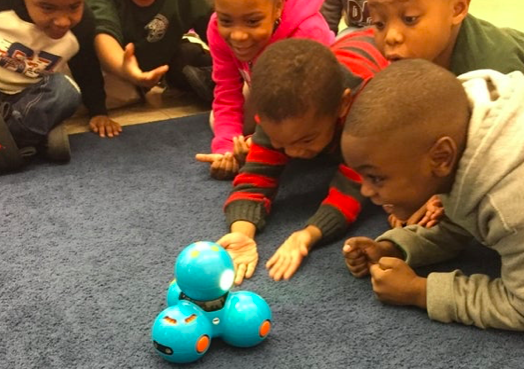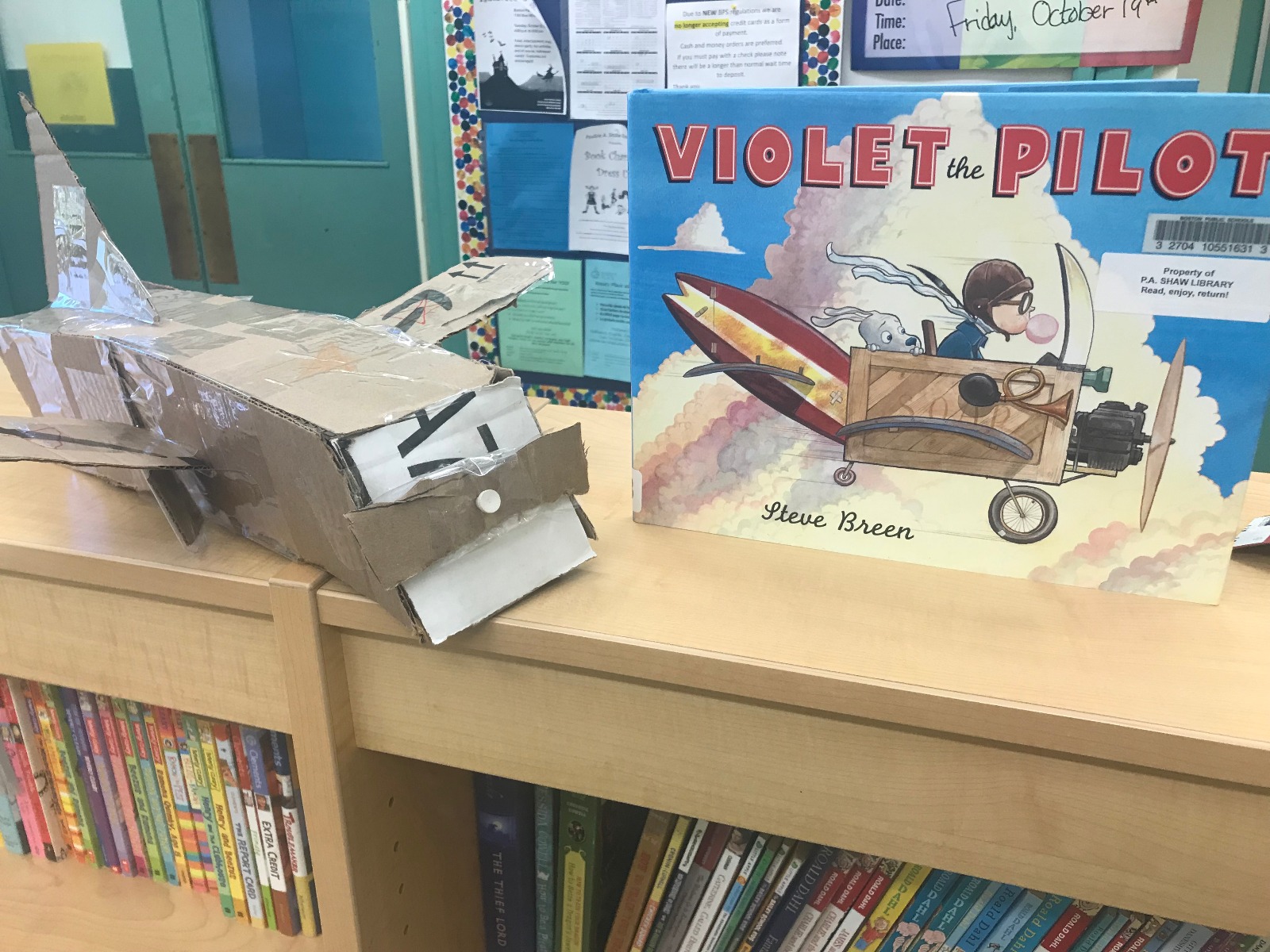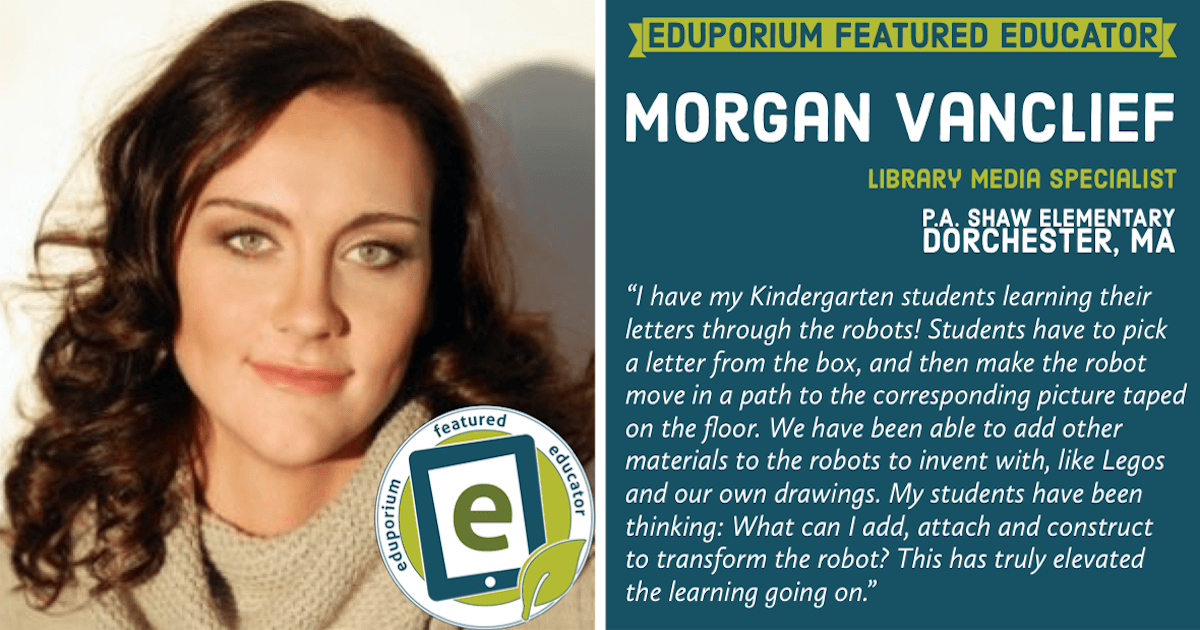This week, we’re sharing more of the innovative efforts made by teachers who love technology and STEAM education. For Teacher Appreciation Week, our Eduporium Featured Educator is Morgan VanClief, a library media specialist who teaches just a couple towns over from us in Dorchester, Massachusetts! Morgan has shared in the success of her students by using various robotics tools to complement their learning in the library and introduced them to some pretty creative projects.
Morgan VanClief
Library Media Specialist, P.A. Shaw Elementary School, Dorchester, MA
Q&A:
Please share any innovative EdTech project(s) you've completed with your student or plan to complete.
Using 3Doodler pens, my first and second graders were introduced firsthand to 3D printing technology and how it can be used to create all sorts of objects. The pens allowed students to illustrate in three dimensions, which they found to be quite exciting. Students drew a variety of shapes and recognizable items, including movie characters and New England sports logos.
They worked on problem solving and critical thinking exercises and, once they became comfortable using the pens, they were given the challenge of building a tower or a 3D cube. Many of the students jumped at the opportunity to take on this difficult task. It required everyone to be patient, concentrate, and persevere. The 3D pens helped us blend math, science, and art in a creative and student-friendly way.
We’ve also gotten to use some Dash and Dot Robots and, upon receiving them, my students' excitement was uncontainable. There were so many shrieks of excitement I could barely keep the students in their seats. When the Dash first opened its eye and took a spin around the room, I cannot even begin to describe the looks of pure awe on the faces of even my most reluctant students. Every single day they ask if we can use the robots. Using the Dash and Dot have allowed even my kindergarten students to understand what a program is and how programs control robots.

They are really starting to learn the basics of robotics. My students started off learning how to control the robots. We have now progressed to using them during literary and science centers in the classroom. I have my kindergarten students learning their letters through the robots! Students have to pick a letter from the box and then make the robot move in a path to the corresponding picture taped on the floor. We have been able to add other materials to the robots to invent with as well, like LEGOs and our own drawings.
My students are always thinking ‘What can I add, attach, and construct to transform the robot?’ This has truly elevated the learning that’s going on and has been so much more than just driving the robots around. I have been able to get my students into a makerspace mindset. The robots have encouraged even my shyest students into creativity, engineering, and design thinking.
At the beginning of the school year, I had our third graders watch a video about Caine’s Arcade. Caine is a young boy who made his own arcade entirely out of cardboard. This served as our inspiration for our first making project in the library.
We studied the engineering design process and the steps we would need to take to make our own cardboard creations come to life. We planned, made blueprints, gathered materials, and got to work! The students did an incredible job of testing out their ideas, making adjustments, and persevering. I am so proud of the third graders and their hard work.
What is a challenge you faced or are facing with your EdTech use? What resources did you use or are in need of?
There is so much disparity in educational resources depending on the wealth and resources of certain areas. I want my students to see technology as an equalizer and something that everyone can use to learn. My students may live in the inner city and come from low-income families, but I have never seen anyone walk into my school more eager to learn! They’re eager to learn and share what they are learning with siblings and grandparents. These kids do not necessarily have much, but they never complain and are always smiling. They love learning about science and technology, but, unfortunately, they don't have access outside of school to experiment and test out their ideas.
I don’t have a budget to purchase resources or materials, so I am constantly fundraising and asking for donations. I believe the more robots I can get (like the Dash & Dot or Ozobots), the better. I believe combining these real robots with coding will ignite my students' imaginations, inspiring them to experiment and build their confidence. These robots are a fun way of learning the essential skills of collaboration, communication, and digital literacy. Computer science education is critical to providing children with opportunities relevant to today's world and having these resources will help to put my underserved students on a level playing field in the future.

What are some of the real-world skills you've seen your students develop through regular EdTech use?
Having a makerspace has given all of my students a chance to create and take charge of their own learning, equipping them with the problem-solving and social-emotional skills to thrive in the future. My students are able to answer real-world problems and essential questions. They have improved their problem-solving and collaboration skills and feel that they are empowered to speak out, take risks, make mistakes, and explore new ideas.
I believe that learning doesn’t just happen. Rather, it’s something you work at. Our makerspace has helped my students develop that growth mindset I want them to have, teaching them to push through obstacles and be resilient in the face of failure. My students need the skills to succeed in a constantly changing world. Robots, computer programming, upcycling, and STEAM building challenges are all engaging ways of learning the essential skills of collaboration, communication, and digital literacy.
What interests you most about Eduporium?
I believe that making will open doors of opportunity for all my students and, hopefully, they will have a positive impact on the world. I think everybody at Eduporium stands by this ideology and wants to help students make meaning out of their learning. I am interested in how Eduporium is working to make their EdTech tools affordable for even those working in low-income areas like myself. Their Educator Discount and grant program are both valuable resources for educators to explore.
We sincerely thank Morgan for speaking with us and wish her and all other teachers a happy Teacher Appreciation Week! Don't forget to follow us on Twitter and Instagram and look out next Friday, too, as we introduce you to another hard-working and innovative educator on our blog!



